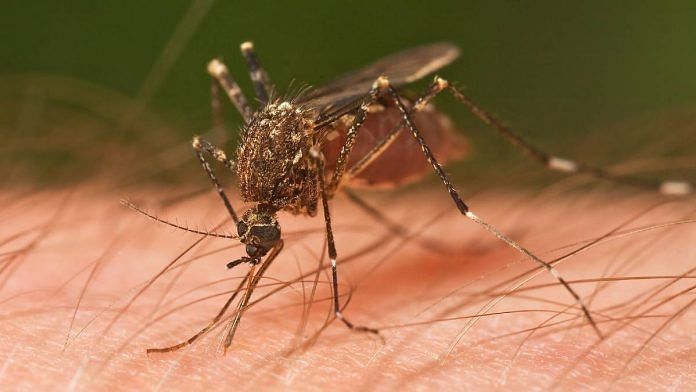New Delhi: A new vaccine candidate for the mosquito-transmitted disease chikungunya has shown promising results. Developed by the French drugmaker Valneva, it tested as safe and effective in Phase 3 trials conducted in the US, the results of which were published in a research paper in The Lancet Monday.
Chikungunya is present in regions of Africa, Southeast Asia, the Indian subcontinent, and subtropical regions of the Americas and, so far, no treatment or vaccine is available for the viral disease. Its symptoms usually appear 4 to 7 days post-infection and include fever, joint and muscular pain, rashes, headache and nausea.
The live-attenuated vaccine, VLA1553, is based on the La Reunion strain of chikungunya, which is of the ‘East Central South African’ genotype.
Its trials were carried out by Valneva, while the research was funded by Coalition for Epidemic Preparedness Innovation, EU’s Horizon 2020 programme as well as Valneva.
According to the research paper, the vaccine candidate “for chikungunya disease was generally well tolerated and produced an immune response in 99 per cent (263/266) of participants”.
Lead author of the paper, Martina Schneider, who is also the clinical strategy manager at Valneva, said: “This could be the first chikungunya virus vaccine candidate for active immunisation of travellers to and residents of endemic areas or areas at risk for an upcoming outbreak. Good antibody persistence after vaccination, as expected from a live-attenuated vaccine, is an important feature given the disease’s unstable epidemiology.”
While the vaccine appears promising, there were several limitations to the study as noted by the authors.
They stated that the study did not take place in an endemic region and therefore the effect of pre-existing immunity on the vaccine’s ability to simulate an immune response is unknown, as is the full safety profile in the population.
Also, since the vaccine uses a live virus altered to be weakened, it may not be usable in certain groups such as pregnant women, or other vulnerable groups, said the authors.
Dr V. Stalin Raj, Associate Professor in the School of Biology at the Indian Institute of Science Education and Research in Thiruvananthapuram, said although “the vaccine has been shown to be safe and well-tolerated in clinical trials, its safety must be evaluated in endemic regions such as India”.
“Going by the results, VLA1553 is a potential vaccine against the chikungunya virus because it elicits an antibody response in individuals of all age groups and maintains a significant quantity of antibody for a year,” added Raj, who wasn’t involved in the study.
The only other live-attenuated vaccine candidate for chikungunya was developed by the US’ Walter Reed Army Institute of Research, and advanced to Phase 2, but its development was terminated in 1998, according to the paper.
Other chikungunya vaccine candidates in the running include one by Emergent BioSolutions, which completed a Phase 3 trial in April 2023, the researchers noted.
The International Vaccine Institute in partnership with Bharat Biotech International is also developing an inactivated vaccine with a Phase 2 or 3 multi-country trial that is supposed to be completed by December this year.
Also Read: Infecting mosquitoes with bacterium Wolbachia cuts dengue spread by 77%, new study claims
The trial
The vaccine was tested between September 2020 and April 2021, with 4,128 participants aged 18 or older enrolled for trials from across the US. A fourth of the participants were given a placebo while the rest were administered the vaccine in their arm.
The researchers then analysed data from those who strictly adhered to the study protocol, which finally consisted of 362 participants, among which 266 received VLA1553, while 96 got the placebo.
After a single dose of vaccination, VLA1553 induced “a strong immune response” in 263 or 98.9 per cent of participants who received the vaccine, 28 days after vaccination.
High seroprotection rates were also sustained up to 180 days after vaccination.
Only two participants showed serious adverse events that were considered related to VLA1553 treatment. One developed a case of mild myalgia or muscle pain. The other suffered a case of over-secretion of the antidiuretic hormone, which helps the kidneys control the amount of water the body loses through urine.
However, the researchers reported that both participants recovered fully.
(Edited by Nida Fatima Siddiqui)
Also Read: Chikungunya strain from India, Bangladesh likely caused 2018-19 Thailand outbreak, study says



